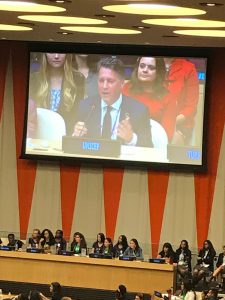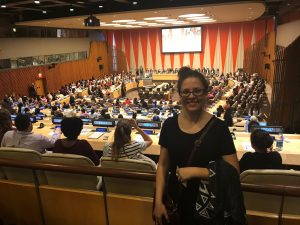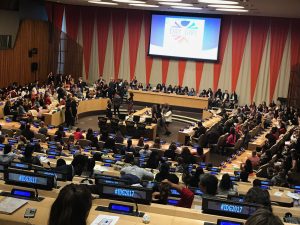This week’s column is slightly different, as I had the opportunity to attend an event in New York City at the United Nations last week. October 11, 2017 marked the 6th annual International Day of the Girl and the 5th annual Girls Speak Out event at the United Nations. I left the event feeling more inspired and motivated to fight for change than ever before.
The U.N. theme for IDG this year was “Justice for Girls.” Several speakers repeatedly and rightly stated that justice for girls is vital for a just society. Justice for girls means equal access to a quality education, freedom from sexual harassment and gender-based violence and the opportunity to be our own person.
The Working Group on Girls and the U.N. missions of Canada, Peru and Turkey sponsored the event. Canadian Minister on Status of Women, Maryam Monsef, started off the event by giving an impassioned speech about coming to Canada as a child refugee, her political career and her belief in full gender equality.
She began by speaking out about privilege, and how every person in attendance is there because of privilege, so we need to use that privilege to help others. She encouraged all of the girls present to look around the room because “in this room are future presidents and secretary generals and astronauts. The people in this room are going to make the world a better place.”
The recurring slogan of the event was taken from a skit acted out by a group of girls who were managing a girls’ crisis hotline. The phrase was: “We love you. We believe in you. You are not alone.” At different points during the event, all of the attendees were made to repeat the phrase. It was really awesome to see, hear and participate in filling the room with that kind of positivity and affirmation.
During the Speak Out session, I was repeatedly hit by the realization that full gender equality will one day become a reality, if by nothing more than the sheer force of will of every girl in that room. We were, and are, fired up and passionate about dismantling the hetero-patriarchal structures in our society to create lasting change. During the event, we talked about the importance of intersectionality and the challenges and expectations girls face simply because they are born girls.
Throughout the event, individual girls spoke about issues like being the only Native American model in their industry, dealing with cultural appropriation and acting as a role model for others; the limbo girls and their families face as they await news about DACA; and the impact of climate change in South Africa. These topics are just the tip of the iceberg. Many other girls shared their stories of oppression and objectification. But they also overwhelmingly spoke about their drive to achieve more; their zest for life and appetite for knowledge and learning; and their struggles and triumphs as they attempt to navigate a world that is inhospitable to girls and women.
Even though I went alone to the event, there was such a sense of camaraderie and a feeling that we were all in this together, striving always to make the world a better place.
Speakers specifically shared stories and statistics of refugee girls. Half of the world’s more than 65 million refugees are women and girls. They live without a home or state, driven from their places of origin by conflict, climate change, natural disasters and famine. Event attendees expressed their commitment toward ensuring a future for refugee girls, specifically to protecting all displaced girls from violence as they travel to their intended destination because their futures are our futures, too.

Deputy Director of UNICEF, Justin Forsyth, speaking about the importance of supporting girls fleeing from Boko Haram in Nigeria.
The speeches of event organizers and attendees, from the missions of Turkey, Canada, Peru and the deputy director of UNICEF, Justin Forsyth, were interspersed with skits and storytelling from the girls’ crisis hotline. In one of the skits, they listed the various expectations that girls are saddled with upon birth, chief among them, the labels of “bossy” and “ambitious.” There is a set of cultural assumptions and patriarchal boundaries meant to stop females from rising above. The reactions from the audience filled me with hope that the next generation of girls will grow up in a world where girls can be girls without negative consequences.
A quote from the event that has stayed with me was about girls’ education. Education is regarded as a basic human right, yet millions of girls around the world face barriers to obtaining an education. When talking about the importance of girls’ education, one of the speakers said that “girls’ education is a beautiful blazing fire that helps bring about change but that beautiful blazing fire tends to be extinguished all too often.” The futures of girls, and their educations, should not be dependent on the (in) efficiency of governments.
Gender equality and women’s rights starts with girls, and we must demand our seat at the table. Millions of girls around the world don’t have a voice, choices or basic security. They are victims of systematic sexual violence and gender based discrimination. By redirecting our efforts to eliminate child marriage, fight climate change and insist on equal education for girls, we will help make the world more suitable for one half of the population.
-Sage Daugherty
Junior Girl
Girl Museum Inc.


